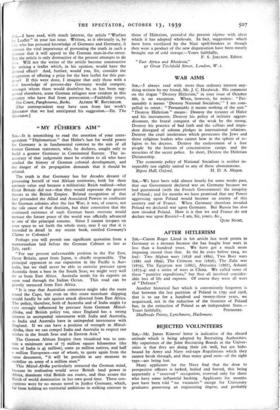" MY FUHRER'S AIM "
SIR,-It is astonishing to read the assertion of your corre- spondent " Diplomaticus " that Hitler's lust for world power for Germany is in fundamental contrast to the aim of all former German statesmen, who, he declares, sought only to build a greater Germany in Continental Europe. The in- accuracy of that judgement must be evident to all who have studied the history of German colonial development, and the danger of its propagation demands that it should be refuted.
The truth is that Germany has for decades dreamt of possessing herself of vast African territories, both for their intrinsic value and because a militaristic Reich realised—what Great Britain did not—that they would represent the gravest threats to the British Empire. Belated recognition of that fact persuaded the Allied and Associated Powers to confiscate the German colonies after the last War; it was, of course, not the sole cause of that decision, but their conviction that the continued existence of such German bases overseas would menace the future peace of the world was officially advanced as one of the principal reasons. Since I cannot trespass on your space to set forth the whole story, may I say that it is recorded in detail in my recent book, entitled Germany's Claims to Colonies?
Perhaps you will permit one significant quotation from a memorandum laid before the German Cabinet as late as July, 1918: " For our present unfavourable position in the Far East, Great Britain, apart from Japan, is chiefly responsible. The principal opponent to our expansion in the Pacific is Aus- tralia, but we shall never be able to exercise pressure upon Australia from a base in the South Seas; we might very well do so from East Africa. Australia needs for its exports an open road through the Indian Ocean. This road can be gravely menaced from East Africa.
" It is true that Australian commerce might take the route round the Cape, but even on this route merchant shipping would hardly be safe against attack directed from East Africa. The policy, therefore, both of Australia and of India might Le very strongly influenced by pressure from German Mittel- Af rika, and British policy too, since England has a strong interest in unimpeded intercourse with India and Australia, as India and Australia have in unimpeded intercourse with England. If we can have a position of strength in Mittel- Af rika, then we can compel India and Australia to respect our wishes in the South Seas and in Eastern Asia."
The German African Empire then visualised was to con- tain a minimum area of 7} million square kilometres (the area of India is 4} million), some 5o million natives, and half a million Europeans—out of whom, to quote again from the same document, " it will be possible at any moment to mobilise an army of a million men."
This Mittel-Africa particularly attracted the German mind, because its realisation would sever British land power in Africa, dominate vital British sea routes, and thus assure the Reich of world domination in her own good time. These con- ceptions were by no means novel in Junker Germany, which, far from holding no territorial ambitions in striking contrast to those of Hitlerism, provided the present regime with ideas which it has adopted wholesale. In fact, suggestions which have been ventilated by the Nazi spell-binders as though they were a product of the new dispensation have been merely brought out of cold storage.—Yours faithfully,
F. S. JOELSON, Editor.
"East Africa and Rhodesia," 95 Great Titchfield Street, London, W. 1.










































 Previous page
Previous page